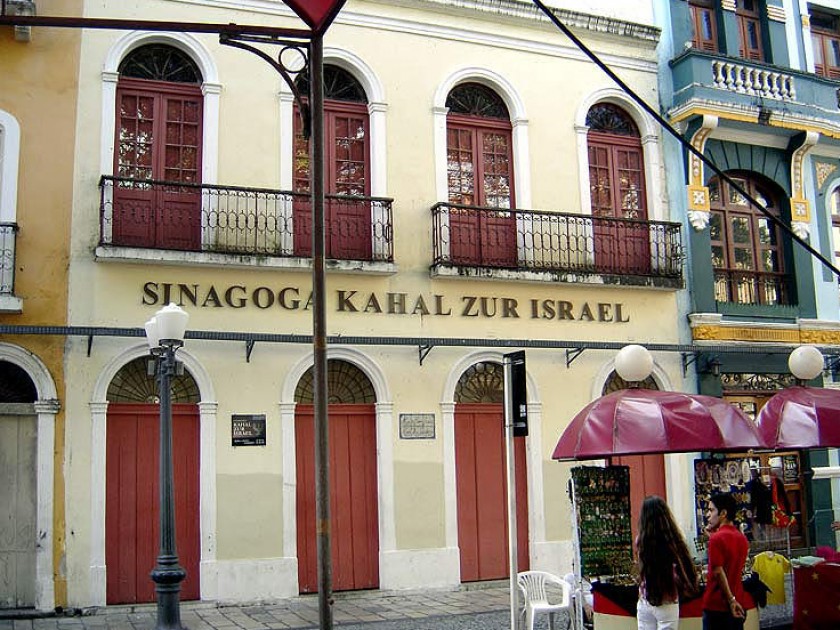Join a community of readers who are committed to Jewish stories
Sign up for JBC’s Nu Reads, a curated selection of Jewish books delivered straight to your door!

Sinagoga Kahal zur Israel, Recife, Brasil. Credit: Ricardo André Frantz
In his last blog, Benjamin Moser wrote about chasing Clarice Lispector around the world.
In the oldest synagogue in the New World, Kahal zur Israel in Recife, I met a friendly grandmother named Berta Schvartz.
Unlike so many other tourists, I had not arrived in search of the Jewish community of the seventeenth century, when northeastern Brazil had been ruled by the Dutch. Instead, I was there to see the second Jewish Recife, the world of the Eastern European immigrants who came to the beautiful island city at the beginning of the twentieth century.
Among them was a little girl born in 1920 in the Ukraine. Brazil’s greatest modern writer, Clarice Lispector, spent her childhood in the working-class neighborhood of Boa Vista, just a few bridges away from the ancient synagogue.
This was where Berta had grown up, a generation after Clarice. I asked her to take me around Boa Vista to help me imagine Clarice’s girlhood universe for my biography, Why This World.
“Every house has memories for me!” Berta exclaimed. “I knew every family here. And look, they’re all gone now.” The sacrifices of the immigrants had allowed their children to move on to reliable plumbing, round-the-clock doormen, and ocean views.
But for Berta, as for Clarice, Boa Vista was world enough. She shows me the center of this community, the Praa Maciel Pinheiro, known in Yiddish as thepletzele, or little square. Here, at number 367, Clarice Lispector spent her childhood.
“The house was so old that the floorboards bounced when we walked,” Tania, Clarice’s sister, told me. “It had colonial windows, a balcony, colonial roof tiles, it really was very old. … We lived on the second floor. We eventually moved because we were afraid that the house would fall over.”
But there it is, still looking creaky. And from its window Mania Lispector, Clarice Lispector’s paralyzed mother, raped in a pogrom in the Ukraine, sat staring, waiting for her disease to run its inevitable course. “She was like a statue in the house,” Clarice’s cousin Anita Rabin remembered.
Clarice was still a girl when the family moved to the Rua da Imperatriz, a street that leads from the pletzele down to the river. Berta shows me the house, and on the way she points out the location of the Casas Feld, an upscale clothing shop presided over by Luiz Feldmus and his wife, a glamorous figure known in Recife as Madame Clara; and Jacob Berenstein’s Livraria Imperatriz, long the best bookshop in Recife and a gathering-place of the city’s intelligentsia.
Clarice’s older sister Elisa wrote that “every afternoon, [their mother] sat on the balcony of the old house on the Rua da Imperatriz, dressed in stiff linen, her smooth black hair combed back, her useless arms crossed on her chest … her head dropped to the side, her eyes staring off, like slightly deadened blue beads.”
Despite the family’s poverty and her mother’s disease, Clarice remembered a magical childhood. “I was so happy that I hid from myself the pain of seeing my mother like that,” Clarice said. “I felt so guilty, because I thought my birth had caused it.”
Her mother died when she was nine. Soon afterward, her father moved the family to Rio de Janeiro, where he hoped to find Jewish husbands for his daughters and where Clarice, already renowned for her beauty, would begin one of the most extraordinary careers in modern literature.
But she never forgot her hometown. Months before her death in 1977, Clarice Lispector made her final trip to Recife. She insisted on staying at a hotel on the pletzele, spending hours gazing out the window at the little square where she grew up. Only the color of her childhood house had changed.
“I remember looking out from the balcony on the Praa Maciel Pinheiro, in Recife, and being afraid of falling: I thought everything was so tall. … It was painted pink. Does a color end? It vanishes into the air, my God.”
Benjamin Moser was born in Houston. He is the author of Why This World: A Biography of Clarice Lispector, a finalist for the National Book Critics’ Circle Award and a New York Times Notable Book. For his work bringing Clarice Lispector to international prominence, he received Brazil’s first State Prize for Cultural Diplomacy. He has published translations from French, Spanish, Portuguese, and Dutch. A former books columnist for Harper’s Magazine and The New York Times Book Review, he has also written for The New Yorker, Conde Nast Traveler, and The New York Review of Books.